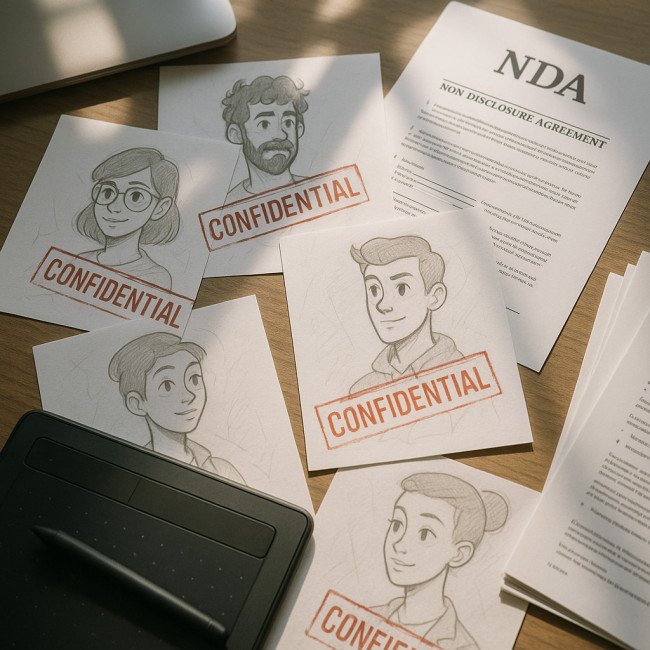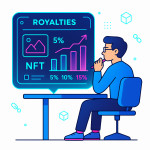Graphiste NDAs explained: keep concept art safe before pitches begin
You poured hours into your mood boards, style frames and character sketches. One leak could hand your unique vision to a rival studio. This guide unpacks Graphiste NDAs—non-disclosure agreements tailored for graphic designers—so you can pitch fearlessly and keep every pixel protected.
Why NDAs matter for concept artists

Studios and brands expect fresh ideas. An airtight Graphiste NDA reassures them that you respect their secrecy and safeguards your own intellectual property (IP). Without it, a casual screen-share or misplaced PDF could jeopardise months of work and potential licensing revenue. An inequitable disclosure can also tarnish your professional reputation, spook potential collaborators and trigger costly legal wrangles that siphon time, cash and creative momentum away from the very ideas you set out to protect. By setting clear expectations up front, you build a partnership where both parties feel safe sharing breakthroughs that can define the visual language of an entire campaign.
- Confidentiality boosts trust. Recruiters browsing the Artfolio image-design directory shortlist designers who already have clear NDA workflows.
- It preserves first-to-market advantage. Original aesthetics stay under wraps until you lock the deal.
- It simplifies dispute resolution. Clear clauses outline jurisdiction, remedies and legal costs should a breach occur.
Key clauses every graphic designer should negotiate
Definition of confidential information
Insist on wording that covers all formats: sketches, layered files, 3D renders and verbal discussions. Vague descriptions leave loopholes.
Permitted use and duration
Limit access strictly to evaluative purposes for the proposed project. A typical Graphiste NDA lasts two to five years. Anything longer can hinder your ability to repurpose discarded concepts later.
Return or destruction of artwork
State that the client must delete digital copies and return physical media within 14 days of a rejected pitch. Add audit rights so you can verify compliance.
Exclusions
Carve out prior-existing ideas or publicly available visuals. This prevents the client from claiming ownership of trends you had already explored elsewhere.
Remedies and legal venue
Specify injunctive relief and a preferred jurisdiction. Some designers choose arbitration to avoid lengthy court battles and public filings.
Steps to secure your concept art before signing
Watermark and embedded metadata
Subtle diagonal watermarks deter unauthorised sharing yet keep art presentable. Pair them with XMP metadata naming you as author and referencing the NDA number.
Low-resolution previews
Send 72 dpi JPGs or flattened PDFs until the NDA is countersigned. Retain layered originals on encrypted drives.
Version control and vault storage
Use cloud folders with expiry links. Tools like frame.io log every view, adding an audit trail. After pitch meetings, revoke access.
Password-protected pitch decks
Create unique passphrases per stakeholder. If a leak occurs, the exposed deck reveals which password—and therefore which viewer—was compromised.
Common NDA pitfalls and how to avoid them
| Risk | Consequence | Preventive move |
|---|---|---|
| Client template overrides your draft | Key protections deleted | Compare versions line-by-line; use track changes |
| “Residuals” clause | Client may reuse general ideas freely | Add a carve-out limiting reuse to unrelated projects |
| No timeline to report breaches | Delayed discovery, harder evidence | Set 48-hour notice requirement |
| Jurisdiction in foreign courts | High travel and legal costs | Negotiate neutral arbitration or your home state |
Integrating NDAs into your pitching workflow
- Pre-pitch: Flag your NDA policy on your website. This signals professionalism and speeds up negotiation.
- First contact: Send a short proposal with a link to your portfolio red-flag checklist to emphasise security.
- NDA dispatch: Provide a digital signature option. E-sign platforms cut turnaround time by 60 %.
- Concept reveal: Share low-res previews only after both parties sign.
- Follow-up: Log who accessed what and when. Reference guides on risk-free sample agreements for physical mock-ups.
Beyond NDAs: monetising protected artwork
Once your concept lands the commission, your focus shifts to royalties and long-term income. Pair the NDA with licensing addenda or smart contracts to automate payments. Learn more in our piece on smart contract royalties.
If the client passes, you can still repurpose textures or colour palettes. Review industry benchmarks in our guide to licensing surface patterns and pitch them elsewhere.
Quick self-audit checklist
- Do all stakeholders sign the same version of the Graphiste NDA?
- Is confidential information clearly defined to include verbal ideas?
- Have you limited the NDA duration to a maximum of five years?
- Does the agreement specify deletion or return of your files?
- Is the governing law convenient and cost-effective for you?
Mini-Quiz: Test your NDA savvy
FAQ
- Can I use a generic NDA template found online?
- It is safer to adapt a template with a lawyer. Tailor definitions to include layered files, thumbnails and pitches delivered verbally.
- What happens if a client refuses to sign?
- Offer to start with a mutual NDA. If they still refuse, weigh the project value against the risk of losing your concept art.
- Is an email agreement legally binding?
- In many regions, yes, but enforcement can be tougher. A formally signed Graphiste NDA provides clearer evidence.
- Should interns at the agency sign too?
- Absolutely. Anyone with access to your files should be bound by confidentiality obligations.
- Can I showcase the work in my portfolio after launch?
- Add a “publicity” clause granting you the right to share final, published assets once the campaign is live.
Take action now
Secure your next pitch by drafting a robust Graphiste NDA today. Need a starting point? Download our free template and book a 30-minute review call. Protect your vision, win the brief and build a thriving creative practice.











